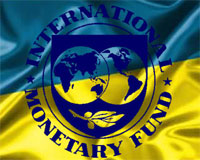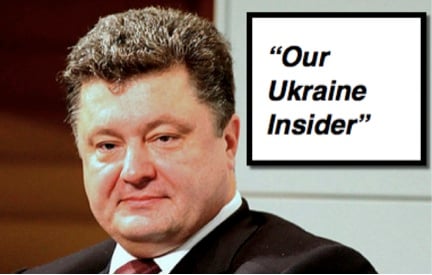Collapse of Ukraine Government: Prime Minister Yatsenyuk Resigns amidst Pressures Exerted by the IMF

Global Research, July 24, 2014
Ukraine’s Prime Minister Arseniy Yatsenyuk announced his resignation in the Rada (Parliament) and that of the entire Cabinet on Thursday, July 24. This decision was taken following the withdrawal of two parties from the coalition government and the non-adoption of two important pieces of legislation, which had been demanded by the International Monetary Fund (IMF)
“I announce my resignation after the collapse of the coalition and the blocking of government initiatives …
“In connection with the breakup of the parliamentary coalition, as well as non-adoption of a number of important bills, I announce my resignation,”
The resignation of the Prime Minister signifies the collapse of the government and the resignation of the entire cabinet.
“But the cabinet members will continue fulfilling their duties until a new coalition is formed in the Rada.”
 On July 24th, the Rada failed to support the government’s bill pertaining to the 2014 budget sequestration, which had been demanded by the IMF on behalf of Kiev’s external creditors. The disbursement by the IMF of the “Second Tranche” of a 17 billion dollar policy based loan was conditional upon the prior adoption of this legislation.
On July 24th, the Rada failed to support the government’s bill pertaining to the 2014 budget sequestration, which had been demanded by the IMF on behalf of Kiev’s external creditors. The disbursement by the IMF of the “Second Tranche” of a 17 billion dollar policy based loan was conditional upon the prior adoption of this legislation.
“The parliament must adopt amendments to the state budget needed to finance our army and also documents needed for cooperation with international financial institutions.[e.g. IMF, World Bank, EBRD]” said PM Yatsenyuk. (emphasis added)
The entire country is in an impasse. No money will be forthcoming from the IMF until this legislation is adopted. In the meantime, Ukraine remains on the blacklist of its external creditors.
Moreover, a controversial draft law on reforming the country’s gas transportation system was rejected (Itar-Tass, July 24, 2014).
Both bills were tied into the government’s negotiations with both the EU and the IMF.
What Happens Next?
The national economy is in crisis, the political structures of the country are in total disarray, all of which is occurring in the immediate wake of the Malaysian Airlines MH17 crash in Eastern Ukraine.
The two parties which left the coalition are The Neo-Nazi Svoboda party and the Centre Right Ukraine Democratic Alliance for Reform (UDAR) Party led by former champion boxer Vitali Klitschko.
 President Poroshenko (left) has intimated that the resignation of the cabinet has paved the way for a process of meaningful political restructuring: “Society wants a full reset of state authorities,” said Mr Poroshenko.
President Poroshenko (left) has intimated that the resignation of the cabinet has paved the way for a process of meaningful political restructuring: “Society wants a full reset of state authorities,” said Mr Poroshenko.
What is implied by Poroshenko’s statement is that the parliamentary process is slated to become defunct inasmuch as Rada is obligated to adopt the legislation demanded by the IMF and the European Union. And if the Rada does not adopt the legislation, the composition of the Parliament will be changed through a process of outright political manipulation.
The 2014 budget project demanded by the IMF includes massive cuts in social spending coupled with increased allocations to the Armed Forces. Its adoption will contribute (virtually overnight) to a further process of the impoverishment of the Ukraine population.
The speaker of the Rada, Mr. Oleksandr Turchynov confirmed that the Ukraine Democratic Alliance for Reform (UDAR) and Svoboda (Freedom) would be invited to propose a candidate to occupy the post of interim Prime Minister.
So much for democracy: the leader of a Neo-Nazi formation Oleh Tyahnybok (Image right) will play a key role in the appointment of an interim Prime Minister to replace Mr. Yatsenyuk. 
Parliamentary elections will only occur if the Rada fails to forge a new coalition government within the next 30 days:
The breakup of the coalition “was probably agreed on by political parties seeking elections and the president,” Yuriy Yakymenko, the head of political research at Kiev’s Razumkov Center, a non-governmental policy group, said by phone.
“Withdrawals from the coalition should not paralyze the parliament’s work,” Poroshenko said before Yatsenyuk announced his resignation.” (Business Week, July 24, 2014
Yatsenyuk intimated in his resignation speech that the State was bankrupt and that failure to abide by IMF demands would create social chaos:
“The fact is that today you failed to vote for the laws, and I have nothing (with which) to pay wages of policemen, doctors, teachers; nothing to buy a rifle with, nothing to fuel an armored personnel carrier with. Today you failed to take a decision to fill the gas storages to allow us to live through the winter, to at last free ourselves from dependence on Russian gas,” (Rada, July 24, 2014)
The IMF Program and the Interim Government
In the days following the Ukraine coup d’Etat of February 23, which led to the ousting of the duly elected president, Wall Street and the IMF–in liaison with the US Treasury and the European Commission in Brussels– had already set the stage for the imposition of the IMF’s “strong economic medicine”.
Following the installation of the interim coalition government, Prime Minister Arseny Yatsenyuk dismissed the need to even negotiate with the IMF. He called for an an unconditional acceptance of IMF shock therapy:
“We have no other choice but to accept the IMF offer”.
Yatsenyuk intimated that Ukraine will “accept whatever offer the IMF and the EU made” (voice of russia.com March 21, 2014, emphasis added)
In surrendering to the IMF at the outset of the interim government in March 2014, Yatsenyuk was fully aware that the proposed IMF-World Bank macro-economic reforms would brutally impoverish millions of people, including those who protested in Maidan against the Yanukovitch government.
The adoption of the more ruthless components of the IMF’s economic package requiring supportive legislation had been delayed until after the May 25 elections.
Cracking Down on the Party of Regions and the Communist Party
Meanwhile, the government is cracking down on the Ukraine Communist Party which is now illegal as well as on the Party of Regions, both of which were firmly opposed to the IMF policy reforms.
Ukraine as An Ally without NATO Status
In turn, the Ministry of Defense has raised the issue of direct US military support in the military campaign in Eastern Ukraine, where the Donbass militia have repealed the forces of the Kiev regime.
“The current situation testifies to clear Russian interference in Ukraine and its military support to terrorist groups active in Ukraine’s eastern regions… Right now, Ukraine’s armed forces need international support more than ever before”, said Deputy Defense Ihor Kabanenko to David Baldwin, commander of the California National Guard. (Kiev Post, July 24, 2014)
Commander Baldwin was in Kiev for high level consultations with the Ministry of Defense. In the course of his meetings with DeputyDefense Minister Ihor Kabanenko, Baldwin announced on behalf of the US government that:
“The United States of America is considering the possibility of granting Ukraine the status of an ally without membership in the North Atlantic Treaty Organization (NATO).
… Baldwin said that the American side highly appreciates its cooperation with the Armed Forces of Ukraine and that it is ready to provide comprehensive support to them.
He stressed that a draft law on prevention of Russian aggression, adoption of which will allow Ukraine to obtain the status of an ally of the United States without NATO membership, is currently under consideration by the United States government.
… President Petro Poroshenko has asked the United States Congress to declare the self-proclaimed “People’s Republic of Luhansk” and “People’s Republic of Donetsk” as terrorist organizations and declare their members as terrorists.Poroshenko believes that when sanctions are not working, there are grounds for appeal to the United States Congress to grant Ukraine the special status of a major ally outside NATO (like Israel, Australia, and the Philippines) to enable it to solve its security problems. (Ukrainian News, July 24, 2014, emphasis added)
The granting of the “status of ally outside NATO” would set the stage for the possible deployment of US and NATO forces inside Ukraine in the context of joint military operations with the Ukraine Armed Forces and National Guard.

